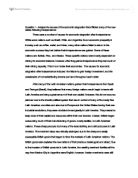The Jesuit ideology is well-communicated through the words of Gabriel. Always, his answers come from an unwavering belief in his interpretation of the Lord's will. During Mendoza's penance, a member of the order inquired as to when Mendoza's penance would end. Gabriel simply replied "God knows". Gabriel's laws came from his beliefs in a higher power, rather than the structure of law found in Europe. To Gabriel, Mendoza's penance was his tribute to God, instead of a self-inflicted punishment. Before joining Gabriel's mission, Mendoza had to be convinced to eat or drink. He felt no responsibility to anyone but his brother. But through the eyes of Gabriel, Mendoza had a responsibility to God to reconcile the killing of his brother. However, Gabriel also was opposed to the corruption of politics and church in European government. During the discussion of the Treaty of Madrid, Gabriel said to the Cardinal "We are not the members of democracy, Father. We are the members of an order." As he stood up to the religious head, Gabriel was acknowledging the difference between the principle of his mission and that of Portugal. After this passive aggressive remark of the ideas being taught at the mission, the Portuguese, who now owned the land, had no choice but to destroy this civilization. The natives felt only an allegiance to God, and none other.
Politics in Europe was largely based upon principles of the Old World Order. The Portuguese still maintained much of their power through the nobility. Much of the nobility also maintained power in the church. They used their powers in politics to drive their actions for personal benefit. The Portuguese wanted to expand their political reach and establish a territory for economic purposes. Although Altimirano had a mission to banish the Jesuits' mission, he was inspired by the utopia created for the Guarani. He said, "Your Holiness, a surgeon to save the body must often hack off a limb. But in truth, nothing could prepare me for the beauty and the power of the limb that I had come here to sever." This is another example of the manipulation of power that took place within Portugal. Altimirano was delegated to deciding the fate of the mission. However, the mission was predisposed to wither on the vine. He had no say in the matter. His duty was to banish the mission, regardless of its accomplishments. He had neither a choice, nor an opinion in this position.
In conclusion, the politics of the nobility killed the religious utopia of the Jesuit Mission. Even the Cardinal, the closest man to God, refused to give the Jesuits a fair chance. During the end of this Old World Order, even the religious harmony of a whole people could not overcome the lust for power of Portugal. Regardless, the Jesuit mission was a milestone of western enlightenment. A tribal group of uncivilized hunters and gatherers achieved a literacy rate of 100%. Nevertheless, this was not important to the Portuguese or even the Cardinal. Within the church, and therefore in politics, religion was not a set of fundamental values for persons to live by. Instead, religion was totalitarian and the church was another house for the monarch. Knowing the inevitability of death, Mendoza and Gabriel refused to leave, becoming martyrs for true freedom of religion. This moving decision is best summarized in the words of Altimirano, "So, your Holiness, now your priests are dead, and I am left alive. But in truth, it is I who am dead, and they who live. For as always, your Holiness, the spirit of the dead will survive in the memory of the living."








